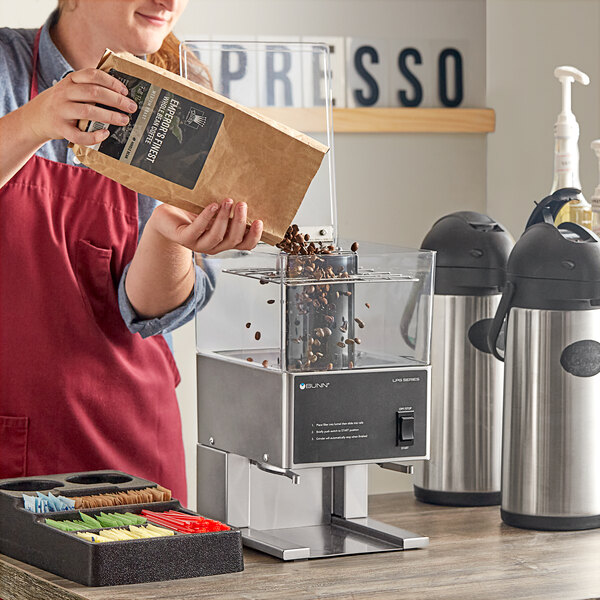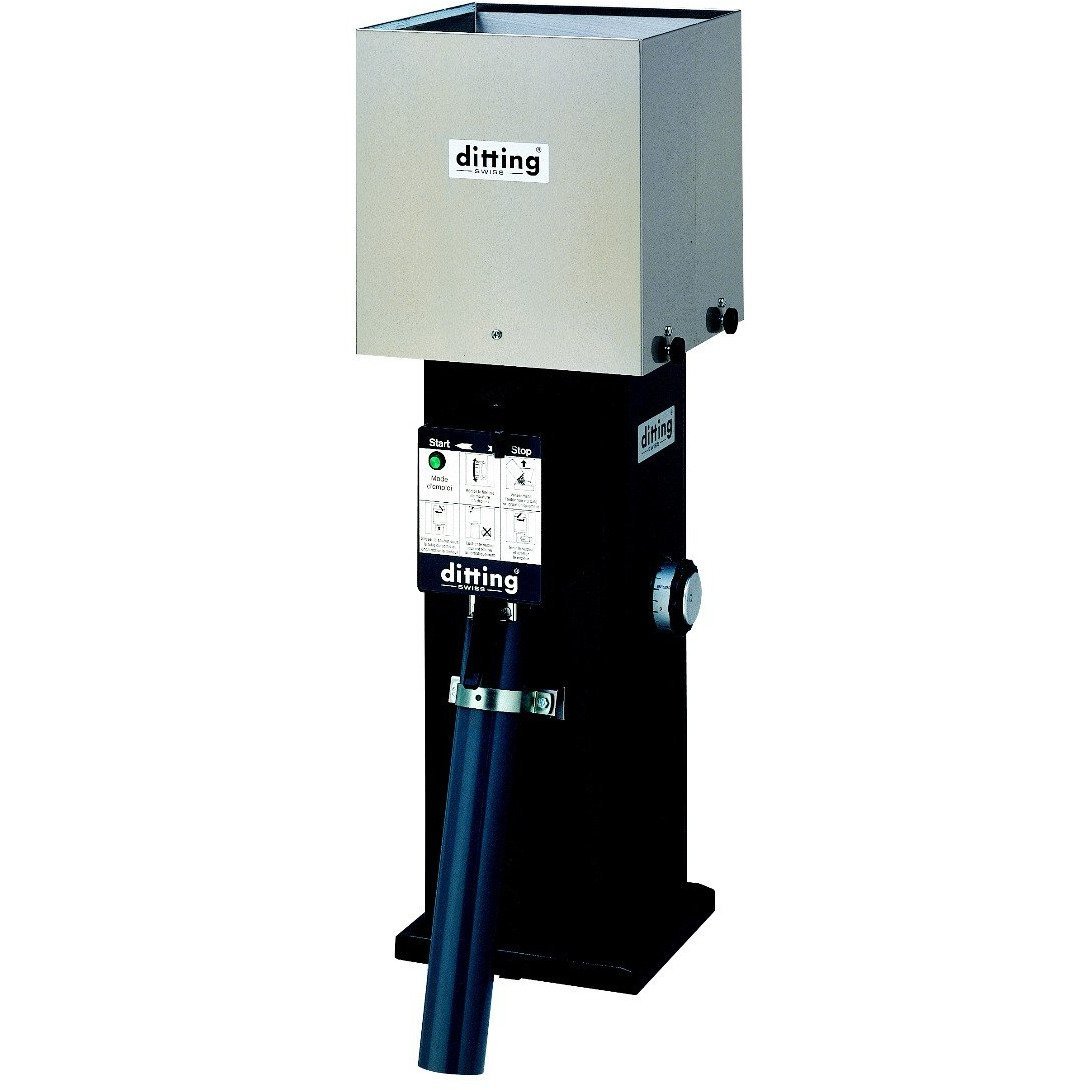Maximize Efficiency with an Industrial Coffee Grinder in Your Shop
Maximize Efficiency with an Industrial Coffee Grinder in Your Shop
Blog Article
Just How to Choose the Perfect Industrial Coffee Mill for Your Business
Picking the excellent industrial coffee mill for your organization is a multifaceted choice that requires mindful consideration of a number of critical factors. It is vital to evaluate your certain grinding needs, consisting of the quantity of coffee refined and the preferred work consistency, as these elements straight influence taste and customer satisfaction. Furthermore, recognizing the various sorts of grinders available can dramatically affect your operational performance. As you browse these factors to consider, one must additionally weigh the ramifications of budget and upkeep. What various other elements could make or damage your choice?
Assess Your Grinding Requirements
When choosing an industrial coffee mill, one must initially examine their grinding needs to guarantee optimum performance and consistency. This initial analysis includes recognizing the quantity of coffee to be processed daily, as well as the preferred grind dimension for various developing techniques. A high-capacity grinder might be required for organizations serving big quantities of coffee, while smaller operations might discover a much more small model adequate.
Additionally, it is necessary to take into consideration the sorts of coffee beans being made use of, as various beans might call for specific grinding strategies to accomplish the very best flavor profile. For instance, oily beans may necessitate a grinder created to handle such features without overheating or clumping.
Specialty coffee companies frequently demand specific work dimensions to improve removal and taste, making it essential to choose a grinder that can supply consistent results. Examining the available area and electric needs will certainly assist in selecting a grinder that fits flawlessly into your functional operations.
Understand Mill Kind
Understanding the various kinds of industrial coffee mills is crucial for making a notified choice that meets particular operational needs. There are largely two classifications of grinders: blade mills and burr grinders.
Blade mills use spinning blades to slice the coffee beans, causing an inconsistent grind dimension - Industrial Coffee Grinder. While they might be much more economical, they are typically not ideal for business applications where precision is crucial
On the various other hand, burr grinders provide an extra uniform work by crushing the beans between 2 surface areas. They can be further classified right into flat burr and cone-shaped burr mills. Apartment burr grinders supply a consistent work dimension and are normally preferred for espresso preparation, while conelike burr mills are versatile and can take care of a variety of brew approaches, from coffee to French press.
When choosing a mill, think about the particular requirements of your company, consisting of wanted work consistency, manufacturing quantity, and the kinds of coffee beverages you plan to offer - Industrial Coffee Grinder. Each grinder kind has its limitations and benefits, so comprehending these nuances makes it possible for notified decision-making that straightens with operational goals
Evaluate Work Dimension Consistency
Accomplishing work size uniformity is necessary for producing top notch coffee, as variants in fragment size can substantially influence removal and taste. When choosing an industrial coffee grinder, it is crucial to evaluate how well the maker preserves harmony in grind size across different sets. Inconsistent grind dimensions can cause irregular extraction, causing a mug that might taste weak or extremely bitter.
To examine work dimension uniformity, think about mills with attributes such as flexible work setups and top notch burrs. Burr grinders, in specific, succeed in generating uniform fragment dimensions contrasted to blade mills. The product and shape of the burrs play a vital function, with stainless-steel and ceramic alternatives offering durability and accuracy.

Think About Production Capability
In the hectic world of coffee manufacturing, taking into consideration production capability is vital for businesses intending to meet need without giving up quality. The production ability of a commercial coffee grinder directly influences a company's capacity to accomplish orders successfully, handle stock, and react to rising and fall market fads.
When examining manufacturing ability, it is important to examine the grinder's output rate, usually determined in pounds per hour. This dimension needs to align with your business's forecasted sales volume and growth targets. For circumstances, a café with a high turnover might need a mill that can process numerous hundred pounds daily, while a smaller sized operation could be enough with a reduced ability design.
Additionally, think about the kind of coffee being refined. Different beans and blends might impact grinding speed and effectiveness, demanding a grinder efficient in handling varied manufacturing demands. It's likewise worth factoring in the mill's capability to maintain regular quality under high output problems, as any kind of fluctuations can influence the last product.
Inevitably, choosing a mill that matches your organization's production ability will certainly guarantee you continue Click Here to be competitive and responsive to client expectations.

Budget Plan and Maintenance Variables
When reviewing the appropriate industrial coffee mill, budget plan and maintenance elements play a significant role in the general decision-making process,. A preliminary financial investment in a top quality grinder his explanation can generate long-term benefits, however it's vital to establish a clear budget that lines up with your service's operational needs. Think about both the acquisition cost and possible functional prices, such as power usage and replacement components.
Upkeep is an additional crucial aspect that can impact your budget plan. Industrial coffee grinders need normal maintenance to ensure optimal efficiency and long life. Review the supplier's recommendations for maintenance, including cleansing timetables and components substitute, as these will impact long-term operational expenses. Additionally, consider the availability of solution and assistance, as trusted aid can minimize downtime and repair work expenses.

Purchasing a mill that is durable yet simple to keep can conserve money gradually. While lower-priced options might be appealing, they might incur greater maintenance costs and minimized performance. Inevitably, balancing initial prices with lasting maintenance and operational efficiency will certainly direct you to the finest choice for your organization's coffee grinding needs.
Final Thought
Choosing the excellent commercial coffee mill requires a comprehensive analysis of grinding demands, mill kinds, grind dimension uniformity, manufacturing capacity, and monetary considerations. A well-chosen grinder not only improves the high quality of the coffee created however additionally contributes to the general success and earnings of the business.
Specialty coffee companies typically demand accurate work dimensions to boost removal and taste, making it crucial to select a grinder that next page can deliver consistent results. Flat burr mills use a constant grind size and are typically preferred for coffee prep work, while conelike burr mills are flexible and can deal with a range of mixture techniques, from espresso to French press.
When selecting a commercial coffee grinder, it is vital to assess exactly how well the device keeps harmony in work dimension throughout different sets. Burr mills, in specific, succeed in creating uniform fragment dimensions contrasted to blade mills.Selecting the perfect commercial coffee grinder necessitates a comprehensive assessment of grinding requirements, mill types, grind dimension consistency, manufacturing capability, and budgetary factors to consider.
Report this page